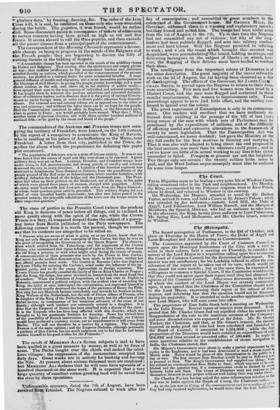Unfavourable accounts, dated the 7th of August, have been seoeived
from Triuidad. The Negroes refused to work after the
day of emancipation ; and assembled in great numbers in the court-yard of the Goverment-house. Sir GEORGE HILL, the Goveraor, addressed them in a warning and explanatory speech; but they hissed and pelted him. The troops had been under arms from the 1st of August to the 7th. Up to that time the Negroes had not committed any act of violence ; but fifty of the ring- leaders had been publicly flogged, and sent into solitary confine- ment and hard labour. Still the Negroes persisted in refusing to work ; and m :,en the vessel 'which brought this account was despatched, were perambulatinrfhe island, holding mtetings, and delivering harangues on the subject of liberty; on which, how- ever, the flogging of their fellows must have tended to confuse their ideas.
The intelligence from the important colony of Demerara is of the same description. The great majority of the slaves refused to work on the 2d of August, the 1st having been observed as a day of thanksgiving. The efforts of the Governor, Sir JAMES CASK • mum. SMITH, to prevail upon the Negroes to return to their duty, were unavailing. Five men and five women were then tried by a District Court, and the men were flogged and sentenced to three months' imprisonment, the women to imprisonment only. These proceedings appear to have had little effect, and the mutiny con- tinued to spread over the colony.
The great experiment of Emancipation is only in its commence- ment. Our readers will recollect that we have uniformly re- frained from exulting in the passage of the bill of last }ear; being aware of the ease with which acts of Parliament may he purchased by the expenditure of millions, and of the difficulty of effecting useful and extensive alterations in the framework of society by mere legislation. That the Emancipation Act was well-intentioned, we never doubted; but gave the Ministry of the day full credit for the best motives in framing and carrying it. That it was also well adapted to bring about the end proposed in the best manner, was more than its admirers could prove ; and as yet we know too little of its actual working to say that it has either succeeded or failed. Prospects at present are not the brightest. Two things only are certain : the twenty million bribe must be paid, and the West Indian sugar-monopoly must also be endured for some time longer.






















 Previous page
Previous page